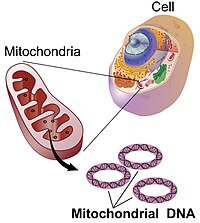
Photo from wikipedia
Alzheimer’s Disease (AD) is the most prevalent form of dementia and is characterized by progressive memory loss and cognitive decline. The underlying mechanism of AD has not been fully understood.… Click to show full abstract
Alzheimer’s Disease (AD) is the most prevalent form of dementia and is characterized by progressive memory loss and cognitive decline. The underlying mechanism of AD has not been fully understood. At present there is no method to detect AD at its early stage. Recent studies indicate that mitochondria dysfunction is related to AD pathogenesis. Altered mitochondria functions are found in AD and influence both amyloid-β (Aβ) and tau pathology. Variations in mitochondria DNA (mtDNA) lead to a change in energy metabolism in the brain and contribute to AD. MtDNA can reflect the status of mitochondria and therefore play an essential role in AD. In this review, we summarize the changes in mtDNA and mtDNA mutations in AD patients and discuss the possibility of mtDNA being a biomarker for the early diagnosis of AD.
Journal Title: Genes
Year Published: 2022
Link to full text (if available)
Share on Social Media: Sign Up to like & get
recommendations!